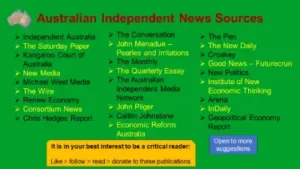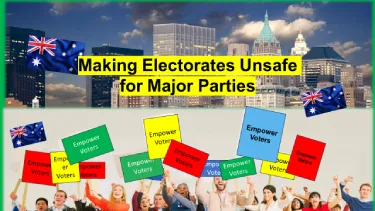Description
Discover the benefits of making electorates unsafe for major parties strengthens democracy and counters hung parliament fears.
Introduction

In Australia, the dominance of major political parties often sidelines public interests. By making electorates unsafe for these parties, we can foster a political system that prioritizes the people. This article explores why this shift is crucial, debunking the fear tactics about hung parliaments and guiding voters to become informed and empowered.
Understanding the Current Political Landscape
Overview
Two major parties control the Australian political landscape: Labor and the Liberal National Party (LNP). These parties have set up a stronghold on governance, often resulting in policies that cater to vested interests rather than the public good.
Impact on Democracy
This dominance leads to a lack of accountability, as major parties prioritize the interests of their backers. The consequence is a political system where the voices of ordinary citizens are often drowned out by corporate and special interest groups.
The Concept of Making Electorates Unsafe for Major Parties
Definition
Making electorates “unsafe” for major parties means creating an environment where their hold on power is not guaranteed. This can be achieved by supporting independent candidates and smaller parties, fostering competition, and ensuring that major parties must work harder to earn votes.
Historical Examples
Instances such as the election of independents in Warringah and Indi show the power of local movements. These electorates, by challenging the status quo, have seen increased accountability and more representative policies.
Benefits
1. Enhanced Accountability: Major parties must address the concerns of their electorate rather than assuming support.
2. Greater Representation: Independent and smaller party candidates often better reflect the diversity and needs of their communities.
3. Responsive Governance: Policies become more reflective of public needs rather than corporate interests.
Debunking Fear Tactics about Hung Parliaments
Common Myths
Labor and LNP often warn voters about the chaos and instability of hung parliaments, suggesting they lead to ineffective governance and policy gridlock.
Reality Check
Hung parliaments can result in more cooperative and balanced governance. They force parties to negotiate and collaborate, leading to more comprehensive and considered policies.
Case Studies
– Australia: The 2010 hung parliament resulted in significant legislative achievements, including the National Broadband Network (NBN) rollout and the Clean Energy Act, which introduced a carbon pricing mechanism. These accomplishments highlight that hung parliaments can be productive and lead to significant policy advancements.
– Germany: Germany’s Bundestag (federal parliament) often works with coalition governments, effectively functioning as hung parliaments. The collaborative approach needed in these situations has resulted in stable governance and robust policies. For instance, the coalition government led by Chancellor Angela Merkel managed the 2008 financial crisis effectively through coordinated economic policies and stimulus packages, keeping Germany’s economic stability and growth.
– New Zealand: The New Zealand Parliament has seen several hung parliaments, most recently in 2017. The coalition government formed between Labour, New Zealand First, and the Green Party led to significant policy changes, including improvements in healthcare, education, and environmental protection.
Becoming an Informed Voter
Researching Candidates

1. Check Track Records: Look into the background and achievements of candidates.
2. Engage in Debates: Attend local forums and debates to hear directly from candidates.
3. Use Reliable Sources: Trustworthy news outlets and peer-reviewed articles can provide unbiased information.
Evaluating Policies
1. Assess Feasibility: Are the proposed policies realistic and actionable?
2. Impact Analysis: Consider the long-term effects of policies on your community and nation.
3. Public Money Use: Ensure policies reflect prudent and beneficial use of public money.
Engagement
Active participation in politics is crucial. Join local community groups, attend council meetings, and engage with your representatives to ensure your voice is heard.
Evaluating Politicians: Actions Speak Louder Than Words
Political promises often paint a hopeful picture, but it’s crucial to evaluate politicians based on their actions rather than their promises. This section will help you discern the difference and make informed decisions.
Why Actions Matter More Than Promises
Political promises are a staple of election campaigns, yet they often stay unfulfilled due to several reasons, including political gridlock, changing priorities, or insincerity. Evaluating a politician’s past actions provides a more correct picture of their true priorities and effectiveness.
Steps to Evaluate Politicians’ Actions
1. Track Record:
– Legislative Achievements: Review the bills and policies they have sponsored or supported. Look for consistency between their promises and legislative actions.
– Voting History: Analyse their voting history on key issues. Websites like They Vote for You can help you track how politicians have voted on various issues.
– Public Statements: Compare public statements and speeches over time to check for consistency in their positions.
2. Accountability and Transparency:
– Public Accountability: Evaluate how open they are about their actions and decisions. Do they regularly communicate with their constituents? Are they willing to answer tough questions and be held accountable?
– Transparency in Governance: Assess their commitment to transparency. Do they support or enact policies that promote open government and reduce corruption?
3. Community Engagement:
– Local Involvement: Investigate their involvement in local issues and community activities. Politicians who are actively engaged in their communities tend to be more attuned to the needs and concerns of their constituents.
– Constituent Services: Look into their record of helping constituents with government-related issues. Effective constituent services reflect a politician’s dedication to serving the public.
4. Follow the Money:
– Campaign Contributions: Examine the sources of their campaign funding. Politicians heavily funded by large corporations or special interest groups may prioritize those interests over public needs.
– Expenditure Reports: Check their expenditure reports to see how they use public money. Prudent use of public funds shows a commitment to fiscal responsibility.
5. Independent Reviews and Ratings:
– Non-Partisan Organizations: Consult ratings and reviews from non-partisan organizations that evaluate politicians based on their performance rather than their party affiliation.
– Media Analysis: Read analyses and reports from reputable media outlets that critically assess politicians’ actions and policies.
Case Study: A Practical Evaluation
Consider an example where a politician promised to improve public transportation but later voted against funding for new infrastructure projects. By examining their voting record and public statements, you can uncover discrepancies between their promises and actions.
Summary
Evaluating politicians based on their actions rather than their promises is essential for holding them accountable and ensuring they genuinely stand for their constituents’ interests. By following these steps, you can make more informed voting decisions and contribute to a more transparent and effective political system.
Question for Readers
How do you assess the actions of your local politicians, and have you noticed any discrepancies between their promises and actions?
Call to Action
Take a closer look at the track records of your local politicians and share your findings with your community to promote informed voting. Encourage others to scrutinize political actions and not just promises.
Social Sharing
If you found this article insightful, please share it with your contacts and on social media to spread awareness about the importance of evaluating politicians’ actions.
Countering Fear with Facts
Evidence-Based Arguments
1. Statistical Data:
– The 2010-2013 Australian hung parliament, often cited as chaotic, passed over 561 bills. This period saw significant legislative achievements, including the National Broadband Network (NBN) rollout and the Clean Energy Act, which introduced a carbon pricing mechanism. These accomplishments highlight that hung parliaments can be productive and lead to significant policy advancements.
2. Expert Opinions:
– Dr. Paul Williams, a political analyst from Griffith University, has argued that hung parliaments can enhance democracy by fostering greater collaboration and compromise. He suggests that the necessity for negotiation among parties can lead to more balanced and well-rounded policies, as seen during the Gillard government’s tenure, where cooperation with independents and minor parties resulted in comprehensive and thoughtful legislation.
3. Historical Precedents:
– Germany’s Bundestag (federal parliament) often runs with coalition governments, effectively functioning as hung parliaments. The collaborative approach needed in these situations has resulted in stable governance and robust policies. For instance, the coalition government led by Chancellor Angela Merkel managed the 2008 financial crisis effectively through coordinated economic policies and stimulus packages, keeping Germany’s economic stability and growth.
Case for Change
Voices from the Ground
Share testimonials from communities that have received help from electing independents or smaller parties. These stories can inspire others to seek change in their own electorates.
Long-Term Vision
Shift the focus from short-term electoral gains to long-term societal benefits. A more representative political system can lead to improved public services, stronger social safety nets, and a more just and fair society.
Conclusion
Recap
By making electorates unsafe for major parties, we can create a political system that is more accountable, representative, and responsive to the needs of the people. Debunking fear tactics about hung parliaments and becoming informed voters are essential steps in this process.
Question for Readers:
How can you contribute to making your electorate more representative of your community’s needs?
Call to Action
Start researching your local candidates today and make your vote count for a more accountable and representative government. Share this article to spread awareness and encourage informed voting.
Social Sharing
If you found this article helpful, please share it with your contacts and on social media.
References:
Australian Electoral Commission: https://www.aec.gov.au
Political Participation in Australia: https://www.aec.gov.au/About_AEC/Publications/files/youth-study/youth_electoral_study_02.pdf
The Benefits of Hung Parliaments: https://www.abc.net.au/news/2022-05-19/election-hung-parliament-explainer/101033200

